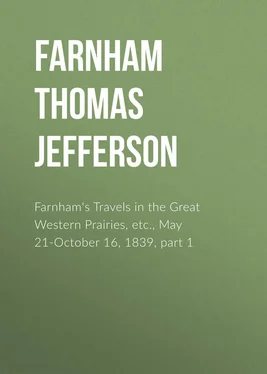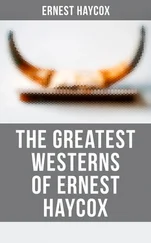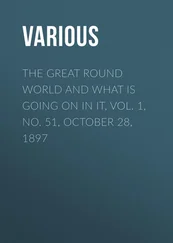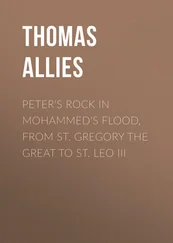Thomas Farnham - Farnham's Travels in the Great Western Prairies, etc., May 21-October 16, 1839, part 1
Здесь есть возможность читать онлайн «Thomas Farnham - Farnham's Travels in the Great Western Prairies, etc., May 21-October 16, 1839, part 1» — ознакомительный отрывок электронной книги совершенно бесплатно, а после прочтения отрывка купить полную версию. В некоторых случаях можно слушать аудио, скачать через торрент в формате fb2 и присутствует краткое содержание. Издательство: Иностранный паблик, Жанр: foreign_antique, foreign_prose, Путешествия и география, на английском языке. Описание произведения, (предисловие) а так же отзывы посетителей доступны на портале библиотеки ЛибКат.
- Название:Farnham's Travels in the Great Western Prairies, etc., May 21-October 16, 1839, part 1
- Автор:
- Издательство:Иностранный паблик
- Жанр:
- Год:неизвестен
- ISBN:нет данных
- Рейтинг книги:3 / 5. Голосов: 1
-
Избранное:Добавить в избранное
- Отзывы:
-
Ваша оценка:
- 60
- 1
- 2
- 3
- 4
- 5
Farnham's Travels in the Great Western Prairies, etc., May 21-October 16, 1839, part 1: краткое содержание, описание и аннотация
Предлагаем к чтению аннотацию, описание, краткое содержание или предисловие (зависит от того, что написал сам автор книги «Farnham's Travels in the Great Western Prairies, etc., May 21-October 16, 1839, part 1»). Если вы не нашли необходимую информацию о книге — напишите в комментариях, мы постараемся отыскать её.
Farnham's Travels in the Great Western Prairies, etc., May 21-October 16, 1839, part 1 — читать онлайн ознакомительный отрывок
Ниже представлен текст книги, разбитый по страницам. Система сохранения места последней прочитанной страницы, позволяет с удобством читать онлайн бесплатно книгу «Farnham's Travels in the Great Western Prairies, etc., May 21-October 16, 1839, part 1», без необходимости каждый раз заново искать на чём Вы остановились. Поставьте закладку, и сможете в любой момент перейти на страницу, на которой закончили чтение.
Интервал:
Закладка:
Camped on the bank of the river where the common tall grass of the prairie grew plentifully; posted our night-guard, and made a part of our meat into soup for supper. I will here give a description of the manner of making this soup. It was indeed a rare dish; and my friends of the trencher – ye who have been spiced, and peppered, and salted, from your youth up, do not sneer when I declare that of all the innovations upon kitchen science which civilization has engrafted upon the good old style of the patriarchs, nothing has produced so depraving an effect upon taste, as these self-same condiments of salt, pepper, &c. But to our soup. It was made of simple meat and water – of pure water, such as kings drank from the streams of the good old land of pyramids and flies, and of the wild meat of the wilderness, untainted with any of the aforesaid condiments – simply boiled, and then eaten with strong, durable iron spoons and butcher-knives. Here I cannot restrain from penning one strong and irrepressible emotion that I well remember to have experienced while stretched upon my couch after our repast. The exceeding comfort of body and mind at that moment undoubtedly gave it being. It was an emotion of condolence for those of my fellow mortals who are engaged in the manufacture of rheumatisms and gout. Could they only for an hour enter the portals of prairie life – for one hour breathe the inspiration of a hunter's transcendentalism – for one hour feed upon the milk and honey and marrow of life's pure unpeppered and unsalted viands, how soon would they forsake that ignoble employment – how soon would their hissing and vulgar laboratories of disease and graves be forsaken, and the crutch and Brandreth's pills be gathered to the tombs of our fathers!
Our next day's march terminated in an encampment with the hunters whom I had sent forward for game. They had fared even worse than ourselves. Four of the seven days they had been absent from the company, and had been without food. Many of the streams, too, that were forded easily by us, were, when they passed, wide and angry floods. These they were obliged to swim, to the great danger of their lives.
On the 18th, however, they overtook Messrs. Walworth and Alvarez's teams, 43 43 For Manuel Alvarez see our volume xx, p. 26, note 5. – Ed.
and were treated with great hospitality by those gentlemen. On the same day they killed a buffalo bull, pulled off the flesh from the back, and commenced drying it over a slow fire preparatory to packing. On the morning of the 19th, two of them started off for us with some strips of meat dangling over the shoulders of their horses. They met us about four o'clock, and with us returned to the place of drying the meat. Our horses were turned loose to eat the dry grass, while we feasted ourselves upon roasted tongue and liver. After this we "caught up" and went on with the intention of encamping with the Santa Féäns; after travelling briskly onward for two hours, we came upon the brow of a hill that overlooks the valley of Pawnee Fork, the largest branch of the Arkansas on its northern side. The Santa Fé traders had encamped on the east bank of the stream. The waggons surrounded an oval piece of ground, their shafts or tongues outside, and the forward wheel of each abreast of the hind wheel of the one before it. This arrangement gave them a fine aspect, when viewed from the hill, over which we were passing.
But we had scarcely time to see the little I described, when a terrific scream of "Pawnee! Pawnee!" arose from a thousand tongues on the farther bank of the river; and Indian women and children ran and shrieked horribly, "Pawnee! Pawnee!" as they sought the glens and bushes of the neighbourhood. We were puzzled to know the object of such an outburst of savage delight, as we deemed it to be, and for a time thought that we might well expect our blood to slumber with the buffalo, whose bones lay bleaching around us. The camp of the traders also was in motion; arms were seized and horses saddled with "hot haste." A moment more, and two whites were galloping warily near us; a moment more brought twenty savage warriors in full paint and plume around us. A quick reconnoitre, and the principal chief rode briskly up to me, shook me warmly by the hand, and with a clearly apparent friendship said "Sacre fœdus" (holy league,) "Kauzaus," "Caw." His warriors followed his example. As soon as our friendly greetings were discovered by some of the minor chiefs, they galloped their fleet horses at full speed over the river, and the women and children issued from their concealments, and lined the bank with their dusky forms. The chiefs rode with us to our camping ground, and remained till dark, examining with great interest the various articles of our travelling equipage; and particularly our tent as it unfolded its broadsides like magic, and assumed the form of a solid white cone. Every arrangement being made to prevent these accomplished thieves from stealing our horses, &c., we supped, and went to make calls upon our neighbours.
The owners of the Santa Fé waggons were men who had seen much of life. Urbane and hospitable, they received us in the kindest manner, and gave us much information in regard to the mountains, the best mode of defence, &c., that proved in our experience remarkably correct. During the afternoon, the chiefs of the Kauzaus sent me a number of buffalo tongues, and other choice bits of meat. But the filth discoverable on their persons generally deterred us from using them. For this they cared little. If their presents were accepted, an obligation was by their laws incurred on our part, from which we could only be relieved by presents in return. To this rule of Indian etiquette we submitted; and a council was accordingly held between myself and the principal chief through an interpreter, to determine upon the amount and quality of my indebtedness in this regard. The final arrangement was, that in consideration of the small amount of property I had then in possession, I would give him two pounds of tobacco, a side-knife, and a few papers of vermillion; but that, on my return, which would be in fourteen months, I should be very rich, and give him more. To all these obligations and pleasant prophecies, I of course gave my most hearty concurrence.
The Caws, or Kauzaus, are notorious thieves. We therefore put out a double guard at night, to watch their predatory operations, with instructions to fire upon them, if they attempted to take our animals. Neither guard nor instructions, however, proved of use; for the tempest, which the experienced old Santa Féäns had seen in the heavens, thunder-cloud in the north-west at sunset, proved a more efficient protection than the arm of man. The cloud rose slowly during the early part of the night, and appeared to hang in suspense of executing its awful purpose. The lightning and heavy rumbling of the thunder were frightful. It came to the zenith about twelve o'clock. When in that position, the cloud covered one-half the heavens, and for some minutes was nearly stationary. After this, the wind broke forth upon it at the horizon, and rolled up the dark masses over our heads – now swelling, now rending to shreds its immense folds. But as yet not a breath of air moved over the plains. The animals stood motionless and silent at the spectacle. The nucleus of electricity was at the zenith, and thence large bolts at last leaped in every direction, and lighted for an instant the earth and skies so intensely, that the eye could not endure the brightness. The report which followed was appalling. The ground trembled – the horses and mules shook with fear, and attempted to escape. But where could they or ourselves have found shelter? The clouds at the next moment appeared in the wildest commotion, struggling with the wind. "Where shall we fly?" could scarcely have been spoken, before the wind struck our tent, tore the stakes from the ground, snapped the centre pole, and buried us in its enraged folds. Every man, we were thirteen in number, immediately seized some portion and held it with all his might. Our opinion at the time was, that the absence of the weight of a single man would have given the storm the victory – our tent would have eloped in the iron embraces of the tempest. We attempted to fit it up again after the violence of the storm had in some degree passed over, but were unable so to do. The remainder of the night was consequently spent in gathering up our loose animals, and in shivering under the cold peltings of the rain.
Читать дальшеИнтервал:
Закладка:
Похожие книги на «Farnham's Travels in the Great Western Prairies, etc., May 21-October 16, 1839, part 1»
Представляем Вашему вниманию похожие книги на «Farnham's Travels in the Great Western Prairies, etc., May 21-October 16, 1839, part 1» списком для выбора. Мы отобрали схожую по названию и смыслу литературу в надежде предоставить читателям больше вариантов отыскать новые, интересные, ещё непрочитанные произведения.
Обсуждение, отзывы о книге «Farnham's Travels in the Great Western Prairies, etc., May 21-October 16, 1839, part 1» и просто собственные мнения читателей. Оставьте ваши комментарии, напишите, что Вы думаете о произведении, его смысле или главных героях. Укажите что конкретно понравилось, а что нет, и почему Вы так считаете.












